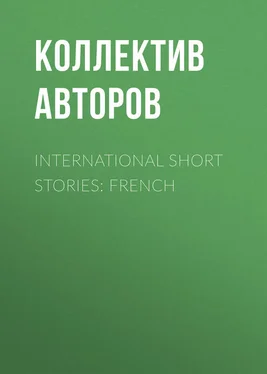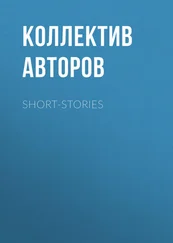Коллектив авторов - International Short Stories - French
Здесь есть возможность читать онлайн «Коллектив авторов - International Short Stories - French» — ознакомительный отрывок электронной книги совершенно бесплатно, а после прочтения отрывка купить полную версию. В некоторых случаях можно слушать аудио, скачать через торрент в формате fb2 и присутствует краткое содержание. Жанр: foreign_antique, foreign_prose, на английском языке. Описание произведения, (предисловие) а так же отзывы посетителей доступны на портале библиотеки ЛибКат.
- Название:International Short Stories: French
- Автор:
- Жанр:
- Год:неизвестен
- ISBN:нет данных
- Рейтинг книги:4 / 5. Голосов: 1
-
Избранное:Добавить в избранное
- Отзывы:
-
Ваша оценка:
- 80
- 1
- 2
- 3
- 4
- 5
International Short Stories: French: краткое содержание, описание и аннотация
Предлагаем к чтению аннотацию, описание, краткое содержание или предисловие (зависит от того, что написал сам автор книги «International Short Stories: French»). Если вы не нашли необходимую информацию о книге — напишите в комментариях, мы постараемся отыскать её.
International Short Stories: French — читать онлайн ознакомительный отрывок
Ниже представлен текст книги, разбитый по страницам. Система сохранения места последней прочитанной страницы, позволяет с удобством читать онлайн бесплатно книгу «International Short Stories: French», без необходимости каждый раз заново искать на чём Вы остановились. Поставьте закладку, и сможете в любой момент перейти на страницу, на которой закончили чтение.
Интервал:
Закладка:
Warned by his father's mistakes, he determined to make the most trifling acts of his old age contribute to the success of the drama which was to take place at his deathbed. Therefore, the greater part of his wealth lay buried in the cellars of his palace at Ferrara, whither he seldom went. The rest of his fortune was invested in a life annuity, so that his wife and children might be interested in keeping him alive. This was a species of cleverness which his father should have practiced; but this Machiavellian scheme was unnecessary in his case. Young Philippe Belvidéro, his son, grew up a Spaniard as conscientiously religious as his father was impious, on the principle of the proverb: "A miserly father, a spendthrift son."
The Abbot of San Lucas was selected by Don Juan to direct the consciences of the Duchess of Belvidéro and of Philippe. This ecclesiastic was a holy man, of fine carriage, well proportioned, with beautiful black eyes and a head like Tiberius. He was wearied with fasting, pale and worn, and continually battling with temptation, like all recluses. The old nobleman still hoped perhaps to be able to kill a monk before finishing his first lease of life. But, whether the Abbot was as clever as Don Juan, or whether Doña Elvira had more prudence or virtue than Spain usually accords to women, Don Juan was obliged to pass his last days like a country parson, without scandal. Sometimes he took pleasure in finding his wife and son remiss in their religious duties, and insisted imperiously that they should fulfil all the obligations imposed upon the faithful by the court of Rome. He was never so happy as when listening to the gallant Abbot of San Lucas, Doña Elvira and Philippe engaged in arguing a case of conscience.
Nevertheless, despite the great care which the lord of Belvidéro bestowed upon his person, the days of decrepitude arrived. With this age of pain came cries of helplessness, cries made the more piteous by the remembrance of his impetuous youth and his ripe maturity. This man, for whom the last jest in the farce was to make others believe in the laws and principles at which he scoffed, was compelled to close his eyes at night upon an uncertainty. This model of good breeding, this duke spirited in an orgy, this brilliant courtier, gracious toward women, whose hearts he had wrung as a peasant bends a willow wand, this man of genius, had an obstinate cough, a troublesome sciatica and a cruel gout. He saw his teeth leave him, as, at the end of an evening, the fairest, best dressed women depart one by one, leaving the ballroom deserted and empty. His bold hands trembled, his graceful limbs tottered, and then one night apoplexy turned its hooked and icy fingers around his throat. From this fateful day he became morose and harsh. He accused his wife and son of being insincere in their devotion, charging that their touching and gentle care was showered upon him so tenderly only because his money was all invested. Elvira and Philippe shed bitter tears, and redoubled their caresses to this malicious old man, whose broken voice would become affectionate to say:
"My friends, my dear wife, you will forgive me, will you not? I torment you sometimes. Ah, great God, how canst Thou make use of me thus to prove these two angelic creatures! I, who should be their joy, am their bane!"
It was thus that he held them at his bedside, making them forget whole months of impatience and cruelty by one hour in which he displayed to them the new treasures of his favor and a false tenderness. It was a paternal system which succeeded infinitely better than that which his father had formerly employed toward him. Finally he reached such a state of illness that manoeuvres like those of a small boat entering a dangerous canal were necessary in order to pus him to bed.
Then the day of death came. This brilliant and skeptical man, whose intellect only was left unimpaired by the general decay, lived between a doctor and a confessor, his two antipathies. But he was jovial with them. Was there not a bright light burning for him behind the veil of the future? Over this veil, leaden and impenetrable to others, transparent to him, the delicate and bewitching delights of youth played like shadows.
It was on a beautiful summer evening that Don Juan felt the approach of death. The Spanish sky was gloriously clear, the orange trees perfumed the air and the stars cast a fresh glowing light. Nature seemed to give pledges of his resurrection. A pious and obedient son regarded him with love and respect. About eleven o'clock he signified his wish to be left alone with this sincere being.
"Philippe," he began, in a voice so tender and affectionate that the young man trembled and wept with happiness, for his father had never said "Philippe" like this before. "Listen to me, my son," continued the dying man. "I have been a great sinner, and all my life I have thought about death. Formerly I was the friend of the great Pope Julius II. This illustrious pontiff feared that the excessive excitability of my feelings would cause me to commit some deadly sin at the moment of my death, after I had received the blessed ointment. He made me a present of a flask of holy water that gushed forth from a rock in the desert. I kept the secret of the theft of the Church's treasure, but I am authorized to reveal the mystery to my son 'in articulo mortis.' You will find the flask in the drawer of the Gothic table which always stands at my bedside. The precious crystals may be of service to you also, my dearest Philippe. Will you swear to me by your eternal salvation that you will carry out my orders faithfully?"
Philippe looked at his father. Don Juan was too well versed in human expression not to know that he could die peacefully in perfect faith in such a look, as his father had died in despair at his own expression.
"You deserve a different father," continued Don Juan. "I must acknowledge that when the estimable Abbot of San Lucas was administering the viaticum' I was thinking of the incompatibility of two so wide-spreading powers as that of the devil and that of God."
"Oh, father!"
"And I said to myself that when Satan makes his peace he will be a great idiot if he does not bargain for the pardon of his followers. This thought haunted me. So, my child, I shall go to hell if you do not carry out my wishes."
"Oh, tell them to me at once, father!"
"As soon as I have closed my eyes," replied Don Juan, "and that may be in a few minutes, you must take my body, still warm, and lay it on a table in the middle of the room. Then put out the lamp – the light of the stars will be sufficient. You must take off my clothes, and while you recite 'Paters' and 'Aves' and uplift your soul to God, you must moisten my eyes, my lips, all my head first, and then my body, with this holy water. But, my dear son, the power of God is great. You must not be astonished at anything."
At this point Don Juan, feeling the approach of death, added in a terrible voice: "Be careful of the flask!"
Then he died gently in the arms of his son, whose tears fell upon his ironical and sallow face.
It was nearly midnight when Don Philippe Belvidéro placed his father's corpse on the table. After kissing the stern forehead and the gray hair he put out the lamp. The soft rays of the moonlight which cast fantastic reflections over the scenery allowed the pious Philippe to discern his father's body dimly, as something white in the midst of the darkness. The young man moistened a cloth in the liquid and then, deep in prayer, he faithfully anointed the revered head. The silence was intense. Then he heard indescribable rustlings, but he attributed them to the wind among the tree-tops. When he had bathed the right arm he felt himself rudely seized at the back of the neck by an arm, young and vigorous – the arm of his father! He gave a piercing cry, and dropped the phial, which fell on the floor and broke. The liquid flowed out.
Читать дальшеИнтервал:
Закладка:
Похожие книги на «International Short Stories: French»
Представляем Вашему вниманию похожие книги на «International Short Stories: French» списком для выбора. Мы отобрали схожую по названию и смыслу литературу в надежде предоставить читателям больше вариантов отыскать новые, интересные, ещё непрочитанные произведения.
Обсуждение, отзывы о книге «International Short Stories: French» и просто собственные мнения читателей. Оставьте ваши комментарии, напишите, что Вы думаете о произведении, его смысле или главных героях. Укажите что конкретно понравилось, а что нет, и почему Вы так считаете.

![Коллектив авторов - Best Short Stories [С англо-русским словарем]](/books/26635/kollektiv-avtorov-best-short-stories-s-anglo-thumb.webp)










